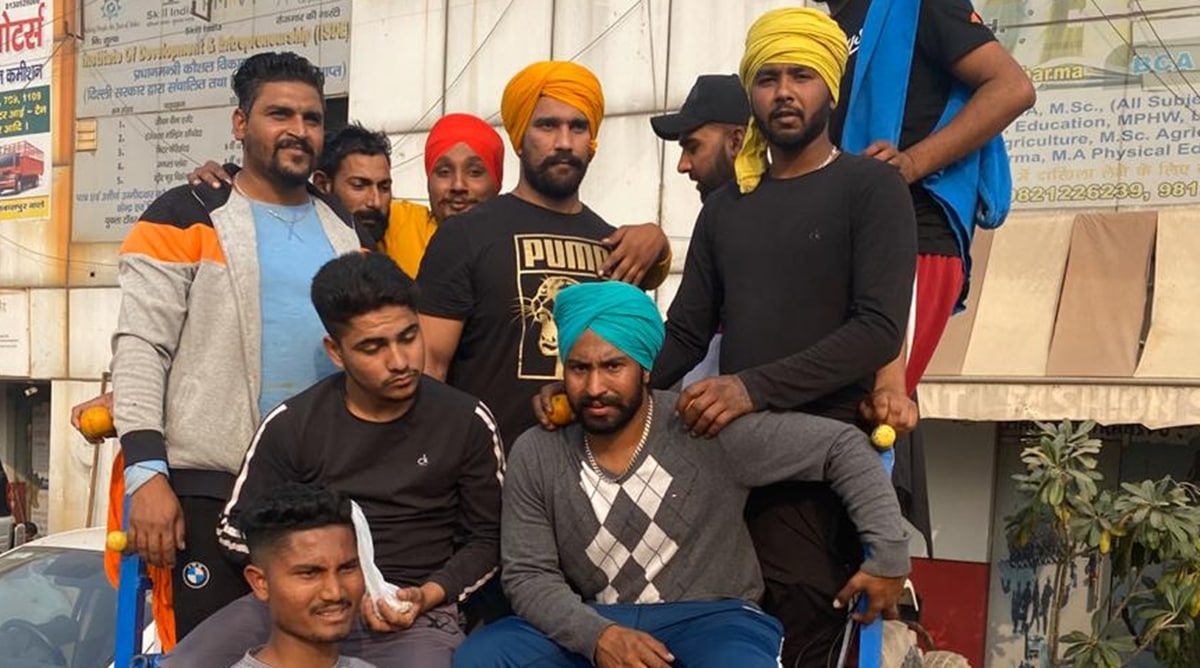 Jassa Patti, the one in the orange turban, reached Tikri border on Friday.
Jassa Patti, the one in the orange turban, reached Tikri border on Friday. For the last one week, wrestler Jaskanwar Singh Gill, better known as Jassa Patti, wakes up at 5 am to prepare for a long day of meetings and protests at the Singhu border near Sonepat. Gill arrived at the site of the farmers’ protest with his entourage in three tractor-trolleys from village Chuslewada in Taran Taran district.
Gill, 27, one of the most sought-after names in dangals across India, reached Tikri border on Friday and is ready for the long haul in the Capital in support of the agitating farmers.
“Kisan de putt han te jina marzi khed layiye, asi rawange kissan hi (We are sons of farmers and we will remain farmers no matter how much we play). We all are here as farmers and not sportspersons. I have been managing the entrance to the stage apart from arranging food and other essentials here. When the supplies run out, we take turns and get them from our village in the three trolleys,” Gill says.
While Gill’s family owns 20 acres of farmland in their village, he has won more than one crore on the Punjab wrestling circuit and in dangals wrestling on mud. An average wrestling season in India sees Gill amass more than 20 cars and motorbikes, apart from almost as many buffaloes and tons of dry fruits.
Gill, whose father Salwinder Singh is a former wrestler, is in Punjab Police and while some of their farmland is under contract/lease with local farmers, he says the new farm laws brought in by the Centre will spell the end of the traditional way of farming in India.
“In rural India, farming forms the main core of the circle of life. From moneylenders to donations of land for schools and other works to organising rural tournaments, especially in wrestling and kabaddi, the ecosystem thrives due to the farming community. If the farm bills affect even one of the components, it will disrupt the circle,” he says.
Jakarta 2018 Asian Games gold medallist shot putter Tejinderpal Singh Toor owns more than 15 acres of land at his village Khosa Pando near Moga. While he has been away from home for training and competition, Toor has given the land on lease with the contracts ranging from six to 12 months. He also has the option of borrowing money in advance from local arthiyas. Toor believes the close relationship with the local contractor keeps matters simple for a lot of farmers.
“I would be away for tours, so we gave our farming land on lease to one of our village friends. Even if we had a discord with him, we end the contract mutually and give the land to someone else, who gives us more money. Under the new laws, there is no such provision and a farmer cannot approach the court if there is a dispute with the company, and a small farmer cannot negotiate. Will the registered APMC play the role of arthiyas in the life of farmers?”
Another 2018 Asian games gold medallist, rower Swaran Singh Virk, whose family owns 23 acres of land in village Dilerwala in Mansa district, has been reading about the laws and demands the withdrawal of the three farm bills, which he terms the death knell for farmers.
“The way the companies can acquire land and marginalise small farmers makes them ‘death bills’. They are also talking of imposing 18 per cent tax on the produce. Where will the farmers go if their produce is of low in quality or quantity?” says Virk.
“My father supported my training and sometimes borrowed money from the local arthiyas to buy me new boats. If the corporates come, can one imagine such facilities on small farms?”
Triple jumper Arpinder Singh’s father ownes 3.5 acres of land at village Harsha Chhina near Amritsar. He believes that with farmers losing some control over their land and produce, more youth will go abroad, already a popular trend in Punjab. “What the government could have done was improve things like MSP and rectify the minor flaws in the mandi system, where sometimes the produce does not get picked and is sold at minimal rates. If farmers cannot negotiate with corporates and cannot fight them in courts, what will he do? Who will want to do farming on small lands?” opines Arpinder.
As for Gill, he is staying put in Delhi even if it means missing the busy dangal season when it restarts around Lohri. “Our gurus have taught us the path of patience but also to fight injustice and not lose heart. I understand that it can be a long fight for our rights. Like a kushti, which can go for more than 40 minutes, we are ready for a peaceful protest till our goal is achieved,” concludes Gill.